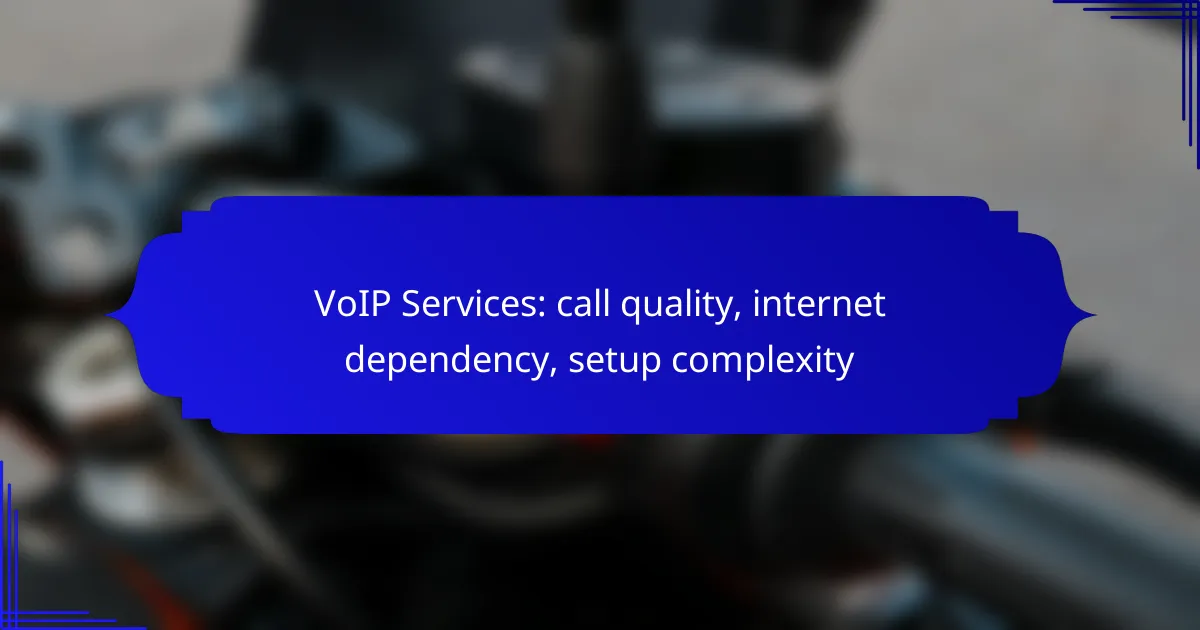VoIP services have revolutionized communication by offering flexibility and cost-effectiveness for both personal and business use. However, the quality of calls is heavily dependent on internet connectivity, with factors such as bandwidth and latency playing a crucial role in user experience. Understanding the complexities of setup and the importance of a stable internet connection is essential for maximizing the benefits of VoIP technology.

What are the best VoIP services in New Zealand?
The best VoIP services in New Zealand offer reliable call quality, easy setup, and flexibility for both personal and business use. Key players include Vocus, 2talk, and Spark Business, each providing unique features and pricing structures to suit different needs.
Vocus VoIP services
Vocus VoIP services are designed for both residential and business customers, emphasizing high call quality and reliability. They provide a range of plans that cater to different usage levels, making it easy to find a suitable option.
With Vocus, users can expect features such as call forwarding, voicemail, and conference calling. Their services are backed by a robust network infrastructure, ensuring minimal downtime and high-quality connections.
2talk VoIP solutions
2talk offers a versatile VoIP solution that is particularly popular among small to medium-sized businesses in New Zealand. Their platform is known for its user-friendly interface and extensive features, including mobile apps for on-the-go access.
One of the key advantages of 2talk is its competitive pricing structure, which includes pay-as-you-go options. This flexibility allows users to scale their services according to their needs without being locked into long-term contracts.
Spark Business VoIP
Spark Business VoIP is tailored for businesses seeking a comprehensive communication solution. It integrates seamlessly with other Spark services, providing a unified platform for voice, data, and internet services.
Customers can benefit from features like call analytics, team messaging, and integration with popular business applications. Spark’s extensive network ensures high call quality and reliability, making it a solid choice for businesses of all sizes.

How does call quality affect VoIP services?
Call quality is crucial for VoIP services as it directly influences user experience. Factors like bandwidth, latency, and jitter can significantly impact the clarity and reliability of voice calls, making it essential to understand and manage these elements for optimal performance.
Importance of bandwidth
Bandwidth refers to the amount of data that can be transmitted over an internet connection in a given time. For VoIP calls, a minimum bandwidth of around 100 kbps per call is recommended to ensure clear audio without interruptions. Insufficient bandwidth can lead to dropped calls and poor sound quality.
To optimize bandwidth usage, consider limiting other internet activities during calls, especially high-bandwidth tasks like streaming video or large downloads. Using Quality of Service (QoS) settings on your router can prioritize VoIP traffic, enhancing call quality.
Impact of latency
Latency is the delay between sending and receiving data, measured in milliseconds (ms). For VoIP, a latency of less than 150 ms is ideal for maintaining a natural conversation flow. Higher latency can result in noticeable delays, causing participants to talk over each other and leading to frustration.
To minimize latency, choose a reliable internet service provider and consider a wired connection instead of Wi-Fi, as it typically offers lower latency. Regularly testing your connection can help identify and address latency issues before they affect calls.
Role of jitter
Jitter refers to the variation in packet arrival times, which can cause audio distortion during calls. A jitter value of less than 30 ms is generally acceptable for VoIP services. Higher jitter can lead to choppy audio and interruptions, negatively impacting communication.
To reduce jitter, ensure a stable internet connection and consider using a dedicated VoIP service that can manage packet delivery effectively. Monitoring tools can help track jitter levels, allowing you to make adjustments as needed to maintain call quality.

What is the internet dependency of VoIP?
VoIP (Voice over Internet Protocol) relies heavily on internet connectivity to facilitate voice communication. The quality of VoIP calls is directly influenced by the speed and stability of the internet connection used.
Required internet speed
To ensure clear and uninterrupted VoIP calls, a minimum internet speed of around 1 Mbps (megabit per second) is typically recommended for a single call. For multiple simultaneous calls, speeds of 3-5 Mbps or higher may be necessary to maintain quality.
Higher speeds can improve call clarity and reduce latency. It’s advisable to test your internet speed regularly to ensure it meets the requirements for VoIP usage.
Effect of network stability
Network stability plays a crucial role in VoIP call quality. Fluctuations in bandwidth or packet loss can lead to dropped calls, echoes, or delays. A stable connection minimizes these issues and enhances the overall experience.
Using a wired connection instead of Wi-Fi can often improve stability. Additionally, prioritizing VoIP traffic on your network can help maintain call quality during peak usage times.
Comparison with traditional phone lines
Unlike traditional phone lines, which rely on circuit-switched networks, VoIP uses packet-switched technology, making it more dependent on internet quality. Traditional lines typically offer consistent call quality, while VoIP can vary based on internet conditions.
VoIP services can be more cost-effective and flexible, but they require a reliable internet connection to function effectively. Understanding these differences can help users make informed choices about their communication options.

How complex is the setup for VoIP services?
The setup for VoIP services can vary in complexity depending on the chosen system and user requirements. Basic installations may be straightforward, while advanced configurations can require more technical knowledge and planning.
Basic setup requirements
To set up a VoIP service, you typically need a reliable internet connection, a VoIP-enabled device (like a phone or computer), and a VoIP service provider. Ensure your internet speed meets the recommended minimum of around 1 Mbps for each simultaneous call to maintain call quality.
Additionally, you may need a router that supports Quality of Service (QoS) settings to prioritize voice traffic. A simple plug-and-play VoIP phone can help streamline the setup process, making it accessible even for non-technical users.
Advanced configuration options
Advanced VoIP setups may involve configuring features like call forwarding, voicemail, and auto-attendants. Users can also explore options for integrating VoIP with existing business systems, such as Customer Relationship Management (CRM) software.
For those with technical expertise, setting up a private branch exchange (PBX) system can provide extensive customization and control over call management. This may include using open-source software like Asterisk or FreePBX, which requires additional configuration and maintenance.
Common troubleshooting steps
If you encounter issues with your VoIP service, start by checking your internet connection to ensure it is stable and meets speed requirements. Restarting your router and VoIP device can often resolve minor connectivity problems.
Other common troubleshooting steps include checking for software updates, ensuring that your firewall settings allow VoIP traffic, and verifying that your device is properly configured with the correct settings provided by your VoIP service provider. If problems persist, contacting customer support for your VoIP service can provide further assistance.

What factors influence VoIP call quality?
VoIP call quality is primarily influenced by network equipment, service provider reliability, and internet connection stability. Understanding these factors can help users optimize their VoIP experience and minimize issues such as dropped calls or poor audio quality.
Network equipment quality
The quality of network equipment, including routers, switches, and VoIP phones, plays a crucial role in call quality. High-quality devices can handle data packets more efficiently, reducing latency and jitter, which are common causes of poor audio during calls.
When selecting network equipment, look for devices that support Quality of Service (QoS) settings. QoS prioritizes VoIP traffic over other types of data, ensuring that calls receive the bandwidth they need. Regular firmware updates can also enhance performance and security.
Service provider reliability
The reliability of your VoIP service provider significantly impacts call quality. A reputable provider should offer a robust infrastructure, low latency, and minimal downtime. Researching customer reviews and service level agreements (SLAs) can help identify providers that consistently deliver high-quality service.
Consider the geographic location of the provider’s servers as well. Providers with local servers can reduce latency, leading to clearer calls. Additionally, ensure that the provider has a responsive customer support team to address any issues that may arise promptly.

What are the costs associated with VoIP services in New Zealand?
The costs of VoIP services in New Zealand can vary widely based on the provider, features, and usage. Generally, users can expect monthly fees ranging from NZD 10 to NZD 50, with additional charges for international calls and premium features.
Monthly Subscription Fees
Most VoIP providers in New Zealand offer monthly subscription plans that include a set number of minutes for local and national calls. Basic plans typically start around NZD 10, while more comprehensive packages with additional features can reach up to NZD 50 or more. It’s essential to compare plans to find one that fits your calling habits.
Setup Costs
Initial setup costs for VoIP services can include purchasing hardware such as VoIP phones or adapters, which may range from NZD 50 to NZD 300. Some providers may offer free or discounted hardware as part of a contract. Be sure to factor in any installation fees if you require professional assistance.
International Calling Rates
International calling rates can significantly impact your overall VoIP costs. While many providers offer competitive rates, they can vary based on the destination country. Rates for calls to popular destinations may be as low as NZD 0.01 per minute, while calls to less common locations can be much higher. Always check the specific rates before making international calls.
Additional Features
VoIP services often come with additional features such as voicemail, call forwarding, and video conferencing, which may incur extra charges. Some providers include these features in their monthly plans, while others may charge separately. Evaluate which features are essential for your needs to avoid unexpected costs.
